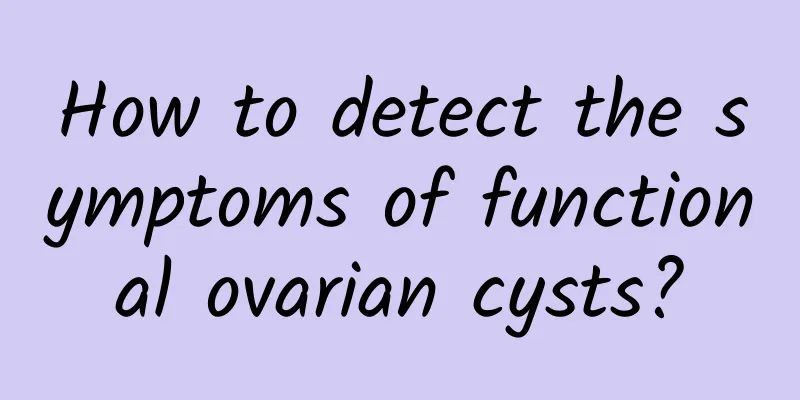What are the symptoms of irregular menstruation

|
What are the symptoms of irregular menstruation? Irregular menstruation is a common gynecological disease. Women sometimes suffer from irregular menstruation in their lives, especially irregular menstruation. 1. Irregular menstruation: That is to say, women’s menstrual problems are always early or delayed. Some women’s menstrual cycles are less than 21 days early, and if they are delayed for more than 35 days, these situations are considered irregular menstruation. 2. Early menstruation: Early menstruation is a common menstrual irregularity. Early menstruation refers to the shortening of a woman's menstrual cycle. Many women's menstrual cycles are shorter than 21 days, and will last for more than two consecutive cycles. This situation actually belongs to the biphasic basal body temperature of ovulatory dysfunctional bleeding, with the follicular phase being only 7 or 8 days, or the luteal phase being shorter than 10 days. 3. Prolonged menstruation: Prolonged menstruation is also a common menstrual irregularity. The main symptoms are normal menstrual cycle, but the menstruation is relatively long. Generally, the menstruation lasts more than 7 days. Some women can have complete menstrual discharge in 2 weeks. At this time, some women will have abdominal pain, heavier menstruation, leucorrhea, yellow or yellow-white, thick, and smelly symptoms. 4. Delayed menstruation: Some women have irregular menstruation and delayed menstruation, which means that the menstruation is missed for more than 7 days, and some women even miss 40 to 50 days, and the symptoms occur for more than 2 consecutive menstrual cycles. The above are the symptoms of irregular menstruation. Since irregular menstruation manifests itself in various forms, the time, form and flow of menstruation vary greatly. This requires women not to take medicine to regulate their menstruation when they have symptoms of irregular menstruation, because the cause may be substantial lesions of the organ or abnormal ovarian function caused by endocrine factors. |
<<: Can adnexitis cause infertility?
>>: Will adenomyosis turn into cancer? What are the treatments?
Recommend
What are the diagnostic methods for endometrial tuberculosis?
When it comes to endometrial tuberculosis, I beli...
How long does it take to get menstruation after abortion?
How long does it take to get your period after an...
Causes of menstrual disorders
Causes of menstrual disorders: Irregular menstrua...
Explore the causes of cervical hypertrophy for you
Cervical hypertrophy may be known to a few people...
What are the risk factors for hyperprolactinemia?
Elevated prolactin is medically known as hyperpro...
What is black discharge? Women should be alert to black discharge in 3 situations
If black secretions flow out of the vagina, it de...
Will endometrial polyps disappear with menstruation?
Will endometrial polyps disappear with menstruati...
Types of Hyperprolactinemia
Prolactin is a polypeptide hormone, also called p...
What are the main causes of vaginitis?
Vaginitis is a common disease for most female fri...
How should women take care of adnexitis in their daily lives?
What are the nursing methods for adnexitis? The o...
Experts briefly describe the symptoms of vulvar leukoplakia
Vulvar leukoplakia is now a very common gynecolog...
What are the causes of uterine fibroids in life?
It is common for women to have uterine fibroids i...
Where to treat endometrial thickening
In life, many female friends are troubled by thic...
Borax is prohibited in alkaline rice dumplings, and sodium trimetaphosphate can be used to maintain Q degree
The Dragon Boat Festival is approaching, and ever...
What does cervical hypertrophy mean?
Cervical hypertrophy is usually caused by chronic...









